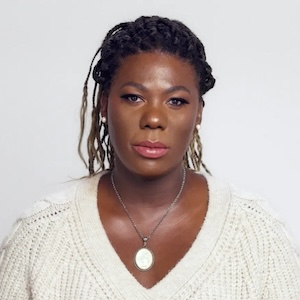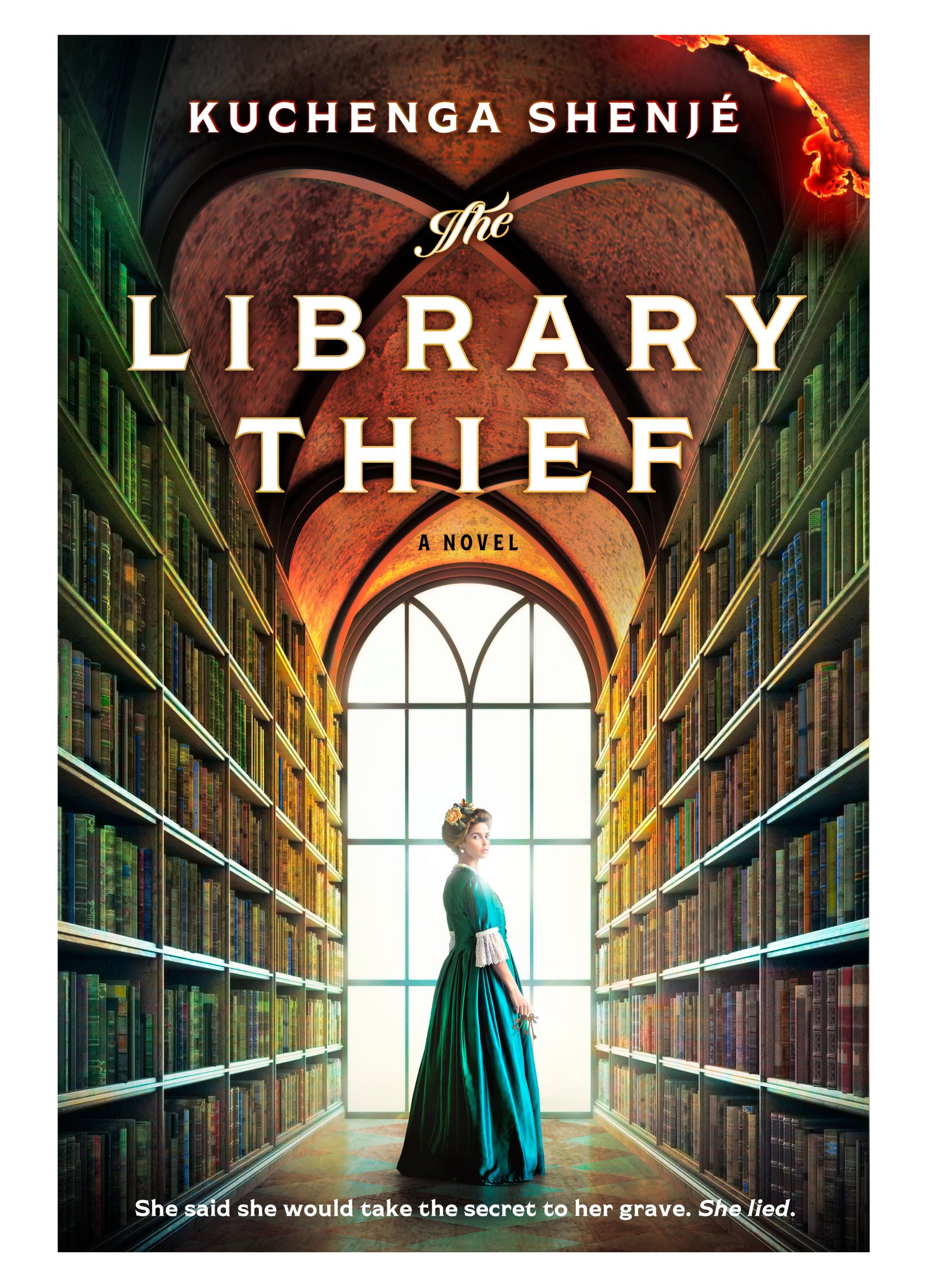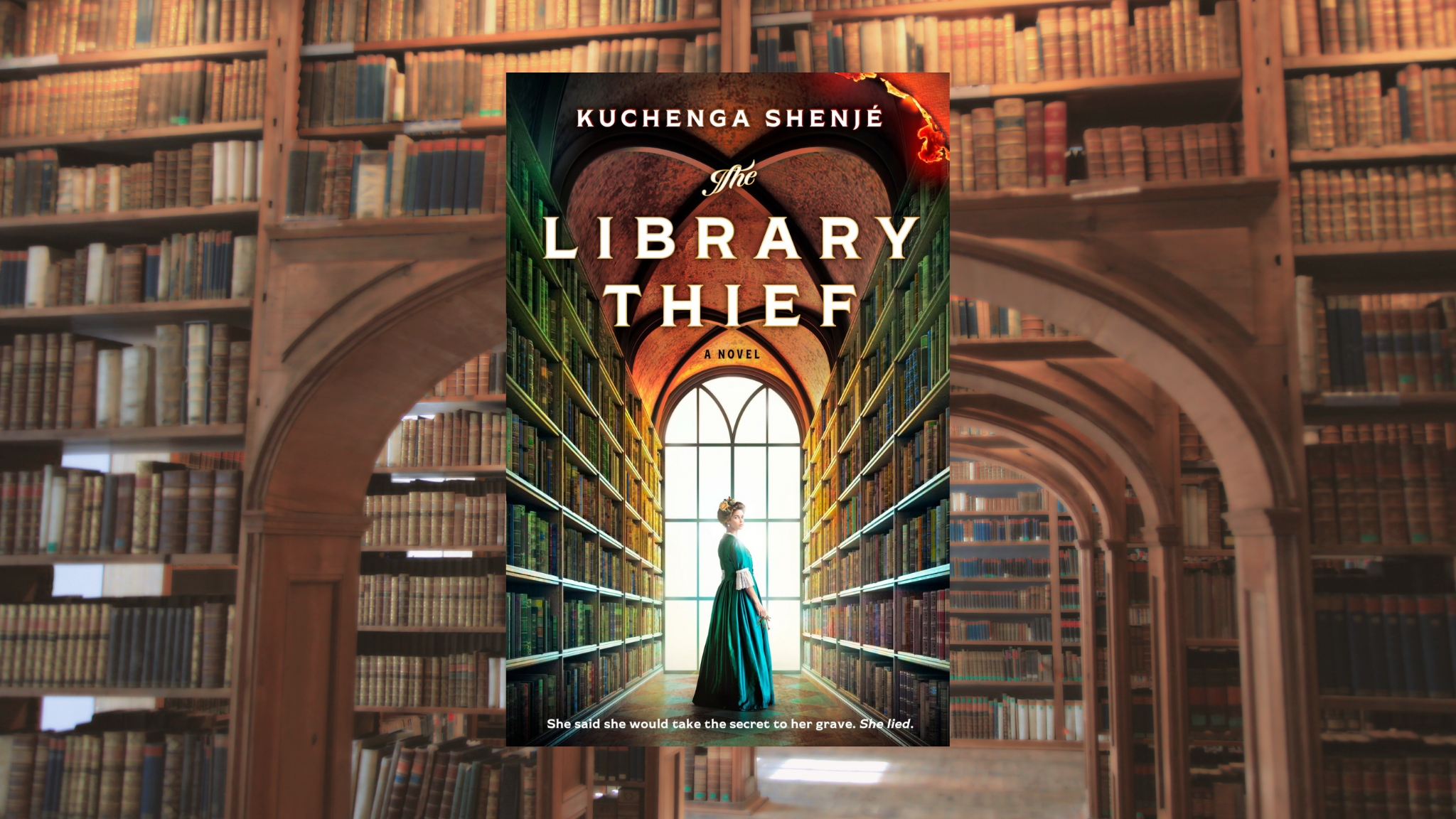The Library Thief by Kuchenga Shenjé
“The way I see it, in any good life you need to die several times to really lead a life worth living. There are little deaths and there are big deaths. My tale has both – and the real tragedy would be if this story were to die with me.
“I was lying when I swore I would take this to my grave. I had no right to promise that.”
It is 1896, and Florence Granger, 20 years old, brought from Jamaica as a baby after her mother died, has just been tossed out on the streets of Manchester, England. Her father has learned of her sexual activity and will not have the scandal in his household. She is on her own – and in Kuchenga Shenjé’s The Library Thief, is about to embark on an extraordinary adventure, a journey of discovery that will lead her into desperate peril and shatter everything she ever thought she knew about herself.
Her father is a bookbinder, she’s learned the trade herself, and on her way out the door, she intercepts a commission from Lord Francis Belfield of Rose Hall to restore his rare book collection. She figures she can talk her way in, and she does, but she finds much more than she’d bargained for. The books are full of secrets, as is everyone and everything connected to the place. Not the least of those secrets: the whispers about what – or who – really caused the recent death of Belfield’s wife.
“I have always had a nose for a good story,” Florence tells us, “and from all my observations I would deduce that there was a scandalously pungent one here.”
Lady Persephone was found drowned in the river at night. Her constant companion had been her Black ladies’ maid Sibyl, who is now gone. The Lady’s sister-in-law Violet has taken to her bed in extravagant mourning: “They were ever so close.” Her brother-in-law, Sir Chester, is a brutal man with an explosive temper. The two remaining servants in what had once been a bustling household are hiding things from Florence. And Lord Belfield is not at all what he seems:
“I had underestimated him so completely … I wondered if his wife had feared him as much as I now did.”
There are fires. There are break-ins. There are assaults, and much worse. And who is that person glimpsed in the hallway at night dressed like Lady Persephone in her portrait?
“Ever since I had arrived at Rose Hall,” says Florence, “I felt as if there was something unsaid about the tragedy, a thread that if unpicked would unravel everything.”
But it is Florence herself who may unravel. “We’ll never belong here,” she is warned. “They’d kill us in a heartbeat if they could.”
The Library Thief is an epic tale of class, race, gender, and self-discovery, a story full of surprises not only for the characters but for its readers. Propulsive, twisty, filled with evocative detail told through a contemporary lens, it constantly upends everything we think we know about the truth of Rose Hall – and Florence Granger.
The truth is something that is very important to Kuchenga Shenjé. A Black British transsexual woman with Jamaican and Zimbabwean parents, she describes her inspiration for The Library Thief :
“The Oprah interview with Meghan Markle and Prince Harry. Meghan said that friends had warned her that the British media would be difficult, which she accepted, but she imagined that they would at least be fair. I saw this as sweetly innocent, but so dangerously naïve.
“Her journey of being perceived at first as a kind of ethnically ambiguous, exotic ‘spicy white’ fascinated me. A morning television segment in the UK chose white women exclusively to be her doppelgangers in the run up to her wedding day. Then she was so viciously racialized as a ‘black’ woman for the first time in her life with an exceedingly British brand of misogynoir.
“I wanted to tell a story that would help explain how the British became this way. The impact that colonialism had on the lives of those in the Mother Country, at a time when riches were continuing to pour in, and they were rapaciously scrambling through Africa.
“Also, the first time I read Harry Potter, I saw Hermione as quite obviously mixed race in my mind’s eye. I was surprised when my peers saw her as white. That’s where my main character, Florence Granger’s surname came from. An ode to Hermione Granger. An impossibly smart woman with impossibly frizzy hair. I saw Florence as a burgeoning suffragette in Manchester with the determination to burn things down in order to gain freedom and justice, as she was living round the corner from Emmeline Pankhurst when The National Union of Women’s Suffrage Societies was being formed.
“I chose the location of the Northwest of England because it was the industrial gateway to The British Empire. The movement and miscegenation of people has been so intentionally concealed. It was thrilling for me to be able to weave in Manchester’s connection to the American South, gaining it the name ‘Cottonopolis’, and the storied history of the black community of Liverpool with their origins and futures crisscrossing the Atlantic.
“However, if it were not for the incredible short film by Kevin Morosky called 500 Pennies, I would never have had the confidence to name Rose Hall after the infamous Jamaican landmark and name Lord Belfield after an enslaved Abyssinian whose grave is in The Lake District.”
As to her own identity, “Day to day, no one sees me as anything but a bougie black girl from round the way, and that’s how I like it. However, I can’t deny that the novel is an affirmation of my belonging. I am so used to my identities being sensationalized in the media. I longed for the opportunity to not write what was expected of me.
“I was eleven years old when I first described myself as Black British in a school project, but my connection to this country is not merely contemporary. I’ve always seen a throughline in the stories of Sarah Forbes Benetta and Dido Elizabeth Belle with that of my own. I belong to a line of Black British Women whose lives were saved by reading and education and their determination to use their intellect as a form of emancipation.”
When she says that her life was saved by reading – and writing – she doesn’t mean it just metaphorically:
“I was lucky enough to be carted into rehab at the age of 28 in 2014. I hadn’t had a day sober for 12 years by that point. The hangover lasted a very long time. Coming up for air I was hit with the realization ‘Oh, I’m a writer.’ My confidence was so low, I had not been able to accept it. I wrote reams and reams in rehab and I’ve not really stopped ever since. It feels quite wonderful to join the pantheon of alcoholic writers now that I’m in recovery and sitting on a number of years of sobriety. I would not have
been able to write what I have without the clarity of mind that comes from sobriety. Plus the daily discipline required. The determination to not pick up a drink one day at a time. I can edit all day long, but when I am writing a draft I work best by rising between 5 and 5:30 am and writing as much as possible before I jump into my day job at 9 am. The kind of life I live now is inconceivable to the alcoholic in active addiction. I had to revolutionize my life in order to become the writer I am now. It was both a birth and a rebirth.
“I never leave home without a notebook. Of course, my phone’s notes section also is brimming with passing thoughts, but there is something about having a dinky little notebook and a pen. I’ve learnt to snap things onto paper as soon as possible. Such great novels have dissipated into the ether because I was arrogant enough to say ‘Oh, I’m so busy, I’ll write that one down later.’ I also have to credit my romantic relationships and the pillow talk they inspire. When I’m at my most vulnerable, my thoughts are also denuded to the point where, when I’m alone again, I become aware that the making of love is definitely my most generative space creatively.”
Those notebooks may have been helpful in getting the period details right, as well.
“There was a lot of research, yes. However, there does come a point where you have to stop digging. Otherwise, one gets bogged down with having to slip this thing in and doing that thing justice and verifying what could have happened or was at least likely to have been able to happen and what not.
“I have to credit my best friend axmed maxamed for the Ida B. Wells mentioned in the story when he told me he was reading Crusade for Justice – The Autobiography of Ida B. Wells. He is always reading ahead of me, so he found out first that she came to England campaigning against lynching in Jim Crow America. This was fundamental to understanding the way anti-racism in the Black diaspora was repeatedly made international. Knowing the worth of international solidarity was both prescient and admirable.
“I owe a huge debt to the glorious building that is Manchester Central Library and a particular book I found on a display there called Manchester in the Victorian Age: The Half-Known City by Gary S. Messenger.
“The most satisfying Wikipedia snorkel was the day I discovered the pearls of the story of Fanny and Stella, two Victorian transgender women who rumbled the courts with sexual scandal in the 1870s. The most surprising thing was to discover that Fanny was born on the road where I went to elementary school. To think that I was unknowingly so physically close to the birthplace of a woman who incited a landmark case for gender nonconformity and sexuality still boggles my mind. We probably played in the same park. and maybe even found conkers at the foot of the same horse chestnut tree.”
There was another personal connection, too. There’s often a bit of the author in one’s characters. Here’s what she shares with Florence: “The inciting incident. Being thrown out of home because of a scandal. I was seventeen when I became homeless and estranged from my family because of my gender nonconformity. The pain is acute and unforgettable, but when the worst thing imaginable happens, and one discovers one can survive, it is wholly transformative, in spite of the trauma. I have gone on to find affinity with people who live life fearlessly and with grand irreverence.”
She found the same affinity when it was time to find an agent and publisher:
“A great bulk of my manuscripts have come together through National Novel Writing Month every November. I never meet my monthly target – nowhere near, in fact – but the effort is still valiant. There were years where I was just scribbling things with no real idea what I was doing. It was only through listening to various podcasts and craft books I learnt that I was outlining. It’s funny because, as writers, everyone is also so focused on
the yield, but that time formulating in a haze, when I’m just daydreaming and existing in those universes once removed are so vital. Thank goodness I’m not in education, because if I were, my homework for my students would involve them just getting on a train and staring out the window for a few hours a week.
“Alas, we do need a serviceable draft at the end of all the reverie. My agent, Silé Edwards, trusts me to not just find my way back, but have a lot of pages to send her at the end of whatever sojourn I impose
on myself. I found her on Twitter in the height of summer 2020 when I was taking part in a lot of online conversations about the experiences of Black British writers in publishing. I chose her because she’s the one who ‘got me’ the most. I was well aware that it was a marriage. Then came my editor, Tilda Key, who I was in a bunker with for so many months splicing and rejigging and expanding. It’s such mucky work, is editing, and it’s for
a particular kind of person. She’s made for it! Then when the manuscript is finally done, the rest of the publishing house is released onto you and one gets a real sense of the institution. There are so many stages. All thrilling. And after so many years in the wilderness being ignored and rejected, to have any attention at all feels like such a relief. Confirmation that it was all worth it and you weren’t crazy. Or crazy in the right kind of way at least.”
For anyone looking for additional thriller stories with white passing main characters, she suggests these four: The Gilded Years by Karin Tanabe; The Personal Librarian by Marie Benedict and Victoria Christopher Murray; The Vanishing Half by Brit Bennett; and Passing by Nella Larsen.
And as for her next book: “It’s quite a fizzy story. The Bildungsroman I needed growing up, I guess. Sex and drugs with footballers and city bankers. A reckoning with death and dysfunction. A heady mix of recovery and ambition telling the tale of a young black trans girl from North London whose triumphant journey takes her down a path of sexual scandal, substance abuse and a mission to prove the Jamaican family legend that she is a descendant of Admiral Horatio Nelson. I’m having a ball.”
About Kuchenga Shenjé:
 Kuchenga Shenjé is a writer, journalist and speaker with work on many media platforms, including gal-dem, British Vogue and Netflix. She has contributed short stories and essays to several anthologies, most notably It’s Not OK to Feel Blue (and Other Lies), Who’s Loving You and Loud Black Girls. Owing to a lifelong obsession with books and the written word, Kuchenga studied creative writing at the Open University. Her work is focused on the perils of loving, being loved and women living out loud throughout the ages. The Library Thief is the ultimate marriage of her passions for history, mystery and rebels. She currently resides in Manchester, where she is determined to continue living a life worth writing about.
Kuchenga Shenjé is a writer, journalist and speaker with work on many media platforms, including gal-dem, British Vogue and Netflix. She has contributed short stories and essays to several anthologies, most notably It’s Not OK to Feel Blue (and Other Lies), Who’s Loving You and Loud Black Girls. Owing to a lifelong obsession with books and the written word, Kuchenga studied creative writing at the Open University. Her work is focused on the perils of loving, being loved and women living out loud throughout the ages. The Library Thief is the ultimate marriage of her passions for history, mystery and rebels. She currently resides in Manchester, where she is determined to continue living a life worth writing about.
(Photo Credit: Kloss Films/ British Vogue)





